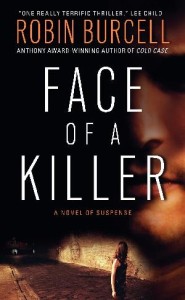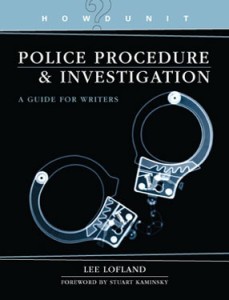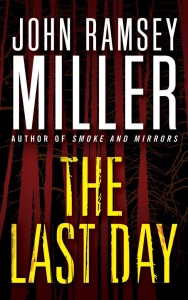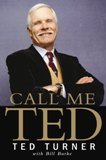 Today The Kill Zone is thrilled to host Robin Burcell, despite the fact that her credentials make some of us feel horribly inferior in comparison. For more than two decades Robin has worked in law enforcement as a police officer, detective, hostage negotiator, and FBI-trained forensic artist. As if that wasn’t enough, she’s won an Anthony Award for her Kate Gillespie series. We especially appreciate her post since it addresses cliches that can be terribly vexing for crime fiction fans. One lucky commentor will receive a signed edition of her latest book. Read on to find out more…
Today The Kill Zone is thrilled to host Robin Burcell, despite the fact that her credentials make some of us feel horribly inferior in comparison. For more than two decades Robin has worked in law enforcement as a police officer, detective, hostage negotiator, and FBI-trained forensic artist. As if that wasn’t enough, she’s won an Anthony Award for her Kate Gillespie series. We especially appreciate her post since it addresses cliches that can be terribly vexing for crime fiction fans. One lucky commentor will receive a signed edition of her latest book. Read on to find out more…
Let’s say you’re writing a book (or perhaps reading one) and you want to verify that the cop stuff is correct. Where do you turn for accurate info?
The secret is… watch CSI.
Just kidding. The real secret is to ply me or any other current or ex cop at mystery conventions with alcoholic  beverages, then remind us of whatever promises we made in our drunken state to answer questions you might have on your work in progress. But what’s a writer to do if they can’t get to those conventions and bribe us with free drinks? I thought I’d compose a Top Ten Stupid Cop Things in books to help you guide your way until you can meet us in the bar.
beverages, then remind us of whatever promises we made in our drunken state to answer questions you might have on your work in progress. But what’s a writer to do if they can’t get to those conventions and bribe us with free drinks? I thought I’d compose a Top Ten Stupid Cop Things in books to help you guide your way until you can meet us in the bar.
10. Getting the jargon/slang wrong for a particular department or part of the country. It’s more than the age-old discussion on perps versus suspects. I’m talking the everyday lingo. It’s the difference that tells me which generation of cop is talking. Saturday Night Live could have done a whole skit on some of the double entendres of this stuff. Typical phrase heard on the radio: "Put your unit at the back door." For years I resisted, instead calling my or anyone else’s "unit" by the more recognizable name of "patrol car." We won’t even go into the whole "back door" thing. And I also resisted calling the detective bureau the "dick squad." I don’t think I was the only generational upstart who started reshaping the language in a department.
9. Really dumb radio transmissions no cop would ever make. Short transmissions are a must. In real life, if you have a long transmission, you “break," for any emergencies that might arise while you’re hogging the mike. So if your characters are busy saying anything longer than one or two short sentences on the radio, have them pick up the phone instead. Radio transmissions vary by region. Some talk in "ten" code, some in "nine,” and many are moving to "plain English," because who the hell remembers the damn codes when the $#!+ hits the fan?
remembers the damn codes when the $#!+ hits the fan?
8. Not knowing the elements of the crime, or what constitutes a crime. A cop looks up, sees a young lady falling to the ground, sees a man running away, and thinks: Purse snatch, a felony. He and his partner jump out, chase after the suspect. One problem. No one saw the crime. They assumed. At least have your cops stop and ask the victim before they get in a foot chase, tackle the suspect and cuff him for a crime they think he committed–because when those officers get to court, the defense is going to rip them apart.
7. The clichéd loner, alcoholic cop with the rumpled raincoat, whose wife and kids were murdered by the serial killer while he was out eating donuts. W hy doesn’t this scenario work? Because the whole donut eating thing is so passé. Let’s pause for history. Donut shops were the only thing open on graveyard shifts where the coffee could be found. That cliché would never work in California. There’s a Starbucks on every corner, and a bagel shop two doors down. And who buys their bagels from Starbucks, when you can get really good ones from Noah’s?
hy doesn’t this scenario work? Because the whole donut eating thing is so passé. Let’s pause for history. Donut shops were the only thing open on graveyard shifts where the coffee could be found. That cliché would never work in California. There’s a Starbucks on every corner, and a bagel shop two doors down. And who buys their bagels from Starbucks, when you can get really good ones from Noah’s?
6. Having cops hired/fired on a whim. Unless a cop resigns on his own, it’s almost an act of congress to hire or fire one. But an even bigger pet peeve is the shoddy hiring background investigations I’ve seen in some really Big Name novels. Backgrounds that allowed, say, the FBI to hire someone who had an arsonist serial killer for a father, but the father’s guilt (and the suspect’s identity) are questionable, and so we should be surprised when our agent turns out to be the real killer. And if they do pass the background, are you saying these arsonist/serial killers are going to pass the psych? There’s a reason why it takes months to complete the background investigation. It almost takes that long just to fill out the background application, which is longer than the average book contract.
5. Evil or stupid police supervisors. Repeat after me: Only some of the bosses are evil or stupid (and no, they didn’t all work for my department). There are actually some pretty decent supervisors still out there. The standing joke is that to get promoted to Sergeant, you have to first have a lobotomy. To make it to Lieutenant and Captain, you have to have your spine removed. True in all cases? No. But some…
4. The hated, despised Internal Affairs cop, who is usually evil or stupid. See # 7 above (which is not to say that if you’re the one being investigated, you don’t tend to think of the IA cops that way, but that’s a different story).
3. Dirty cops planting phony evidence in that overdone bad cop cliché manner. If you’re going to write this, do it better than anyone else. One of the best scenes I saw in a movie was where a dirty cop was seen committing a crime on a surveillance video which was booked into evidence and was going to nail him. The dirty cop set up a “window smash” of a business—with a highly magnetic device used to shatter the window. It in turn was booked into evidence right next to the surveillance tape, which it then demagnetized and was rendered useless. Such a scenario would be difficult to accomplish in this digital age, but back then it was way cool.
 2. Stupid blunders at crime scenes. Being aware of what can contaminate a crime scene takes more than simply watching the latest episode of CSI. Just knowing the basics can help, everything from keeping a crime scene log to what constitutes trace evidence and cross-contamination. Keep this in mind next time your sleuth picks up a phone at the scene of the murder, tromping across a carpet, leaving fiber evidence.
2. Stupid blunders at crime scenes. Being aware of what can contaminate a crime scene takes more than simply watching the latest episode of CSI. Just knowing the basics can help, everything from keeping a crime scene log to what constitutes trace evidence and cross-contamination. Keep this in mind next time your sleuth picks up a phone at the scene of the murder, tromping across a carpet, leaving fiber evidence.
And the top ten pet peeve, in my opinion?
1. Bad officer safety. This is equal to the sleuth investigating a noise outside, when she knows the killer is lurking around somewhere. Cop-wise, I’m talking things like cops showing up at a suspect’s house without backup. These guys are assigned partners for a reason. Safety is one of them, but so, too, is having a second set of eyes and ears for investigative purposes, as well as for testifying later in court. I hate it when writers shove the TSTL syndrome (too stupid to live) on their characters to foster an exciting climax.
So, aside from the age-old "safety on a Glock", what are your stupid cop (or amateur sleuth) pet peeves in books?
Robin Burcell, a veteran cop of twenty-something years, dutifully avoids all the above pet peeves in her latest novel, FACE OF A KILLER, about an FBI forensic artist. You can verify this fact by reading the first chapter on her website






